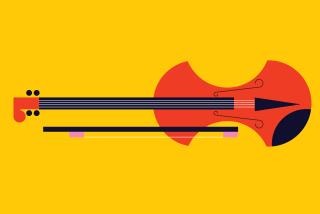For China’s Stradivarius, Violins Are a Labor of Love
- Share via
BEIJING — Tucked away in a dusty corner of Beijing, one of the world’s best violin-makers labors for love, not profit.
Almost unknown outside China, Dai Hongxiang, known by his followers as the Chinese Stradivarius, professes to a level of job satisfaction rare in this proletarian society.
The instruments he produces are prized by China’s large community of fine, but equally obscure, classical musicians.
But the unassuming craftsman said he did not strive for personal fame.
“Only my violins are outstanding,” Dai said during an interview in his workshop.
Dai, 63, is one of four international prize-winning violin craftsmen in China, and is considered the master of masters, one veteran professional musician said.
In 1983 he won a gold medal at the International Violin-Making Competition in Kassel, Germany, against more than 300 masters from 26 countries. The contest was to celebrate the 200th birthday of Louis Spohr, Kassel’s court bandmaster and violin virtuoso in the early 19th Century.
“His violins are known for their bigness and brightness of sound,” a young violinist said. “I would love to own one; they are the best in China.”
At about $1,900, the cost of one of his best violins seems incredibly low compared to the tens of thousands of dollars commanded by European-made instruments.
“The Chinese cannot afford that much, so the price is kept low,” Dai said. “I am not a businessman. I do it for the love of it.”
Local musicians scrimp and save for the purchase price, and Dai sells others to overseas Chinese and the few foreigners who have heard his name.
Years ago, when he worked in the state-owned Beijing Musical Instruments Factory, the government exported his best violins for as much as $10,000 each.
He earned 350 yuan ($67) a month when he retired from the factory in 1989 after 38 years of service. “I was surely the highest paid violin-maker in China.”
Most urban workers earn about $30 a month.
He jokes about how his students invoke his name when they try to sell their violins. “They can get a higher price when they say ‘Mr. Dai made my violin.’ ”
Dai inscribes his name inside each of his instruments, visible through the f-shaped sound holes.
A prized possession is a letter from the then-concertmaster of the Boston Symphony Orchestra who praised the quality of the Dai violin he played while on tour in China in 1979.
But outside the close-knit Chinese music world, Dai is virtually unknown, another of the obscure marvels lying behind the drab gray walls of Beijing.
Dai’s neighborhood with its crumbling buildings and dust-blown stairwells in Hepingli, the city’s musician colony, is deceptive. It is home to thousands of gifted artists--a sort of Chinese Greenwich Village without the chic shops and restaurants.
And in a country where artistic freedom is never taken for granted, Dai the craftsman carries on in what seems sublime contentment.
“This is a spiritual thing for me,” he said as he showed the fruit of his labor, a maple-finished beauty with ebony in its neck and chin rest. “I carry on because I’d be lost without it.”
Posters of priceless Stradivarius and Guarnerius violins bedeck the otherwise drab interior of his workshop.
Dai actually never learned to play the violin.
“Instead, I played the viola because you can disguise your mistakes much easier than with the violin,” Dai laughed. He used to lead the factory’s orchestra.
He works surrounded by unfinished violin bodies he has painstakingly carved and aging wood waiting to be used.
Behind his bench stands an alchemist’s shelf full of mysterious jars of beeswax, pine resins and other natural ingredients for the varnish that determines the violin’s tone.
“Of course, I can’t tell you the key secrets behind the varnish I use to bring out the violin’s sound,” Dai said.
Like his hero, the early 18th-Century violin-making immortal, Antonio Stradivarius, Dai divulges the recipe only to a few select disciples.
Dai, who wears a hearing aid in his left ear, relies on his circle of musician friends to test his violins for him.
It takes about a month to make a first-rate instrument, and Dai said he crafts about 10 a year.
In all of China, craftsmen make only about 300 such fine violins annually. State factories churn out 200,000 low-cost violins, with some selling for less than $20.
“In China you have cheap labor so you can crank out a lot of violins,” Dai said. “But cheap quality means nothing.”
More to Read
The biggest entertainment stories
Get our big stories about Hollywood, film, television, music, arts, culture and more right in your inbox as soon as they publish.
You may occasionally receive promotional content from the Los Angeles Times.










